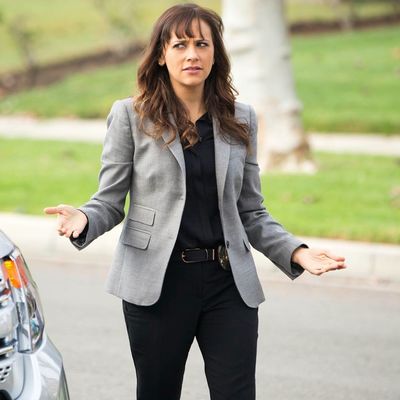
Should we have a little talk about how humor is subjective? Sure, let’s. It’s very subjective. Lots of people love simple-but-impossible-task humor — think the Three Stooges, or the majority of physical comedy bits. Clowning is often in this category. Some people like sight gags — think Airplane!. Many children enjoy Amelia Bedelia books. If this is you, then Angie Tribeca is right up your alley. If this is not you, the show is alienating and severely unpleasant. It’s not a matter of funny or not funny. Maybe more so than for any other comedy in recent memory, if Angie Tribeca is not for you, it is overwhelmingly, catastrophically not for you. On the flip side, if the idea of a character wanting to “set the record straight” and then reaching down to the coffee table and adjusting the positions of a pile of LPs delights you, welcome home.
Tribeca, created by Steve and Nancy Carell, stars an amiable Rashida Jones as the titular character, a police officer who starts every day with a training montage that destroys her entire apartment. She gets paired up with Jay Geils (Hayes MacArthur, Go On), against her wishes — she’s had 236 previous partners, and something bad has happened to every one. Many, many jokes about cop-show clichés ensue. Around these jokes are other gags, some better than others. The pilot’s best scene comes in a studio-art class; as the camera passes over different students’ drawings, the professor murmurs, “Good, good” — and then we see one student simply writing, “Good, good,” on their paper. Ten points to Angie Tribeca for that. But it doesn’t build to anything, or move forward in any meaningful way. The jokes aren’t in service to the story; the story is in service to the jokes.
And that ultimately leads to the show feeling like a series of asides, without any connective tissue holding the ideas together. TBS is airing the ten-episode first season over and over again Sunday, in a 25-hour block meant to generate buzz and binge-watching, but this brings out Tribeca’s biggest weakness. It’s a list of jokes, but they don’t coalesce into a whole episode, let alone a whole series. The show’s rhythms get so predictable that watching more than two in a row means you can anticipate where every joke will be placed. Watching ten in a row, you feel like you have an uncomfortable psychic connection to the series. (I … watched all ten in a row. I don’t recommend it.)
Angie Tribeca is positioning itself as the modern-day successor to Police Squad, and to its credit, that’s a sensibility largely absent from television today. Shows like Childrens Hospital are similarly faux-serious, but that and other Adult Swim series inject their own kind of kooky absurdity alongside their parody; this is more of a throwback take. “I can’t believe I spent a whole montage with you,” an escort tells Geils, in a line straight out of the Zucker, Abrahams, and Zucker fourth-wall-breaking playbook.
There are so many vile comedies out there, shows with toxic attitudes and degrading ideas, shows that harm culture and debase us. Angie Tribeca is certainly not that. Still, there are no bigger ideas at play here, nothing in particular being said. A bunch of talented people got together and made a credible TV knockoff of The Naked Gun. It’s itself, and it’s an abundantly silly, if very lightweight, show.

